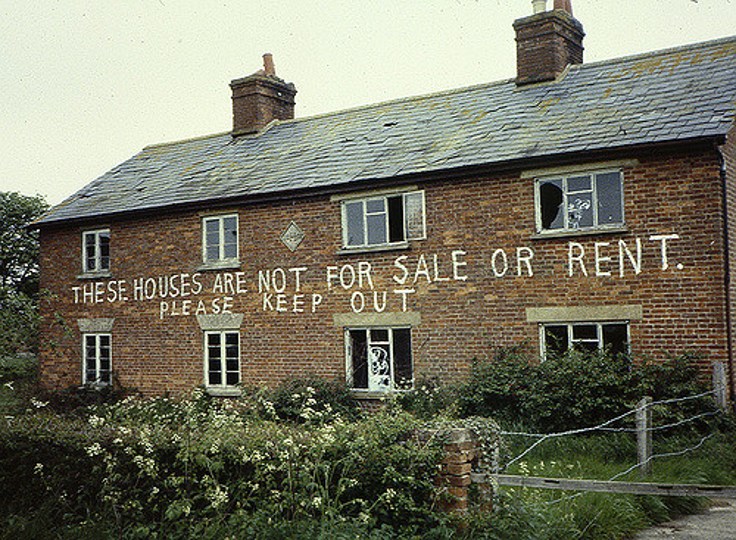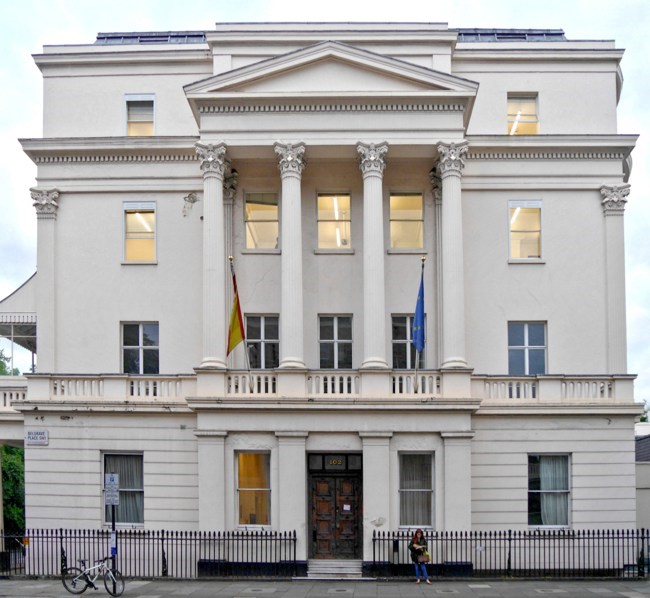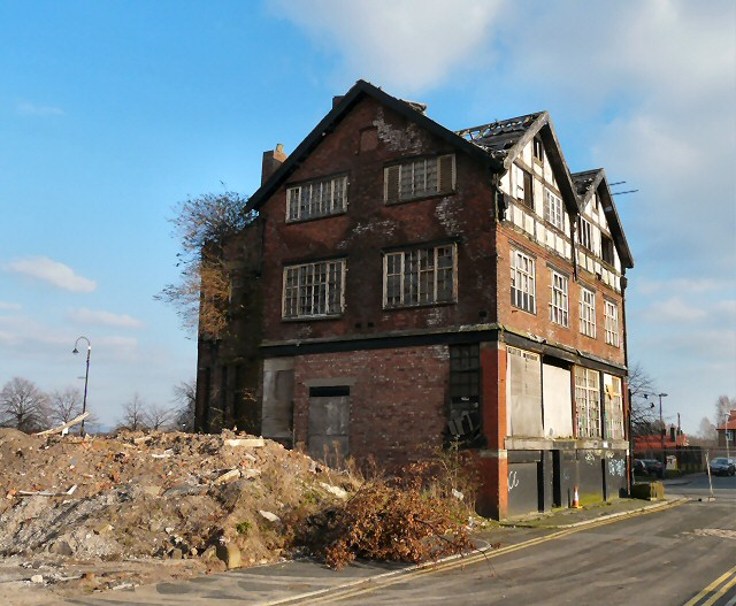Just last month, the devastating fire at Grenfell Tower left at least 80 dead and hundreds without a home. This led to a call from Labour MP Jeremy Corbyn to seize empty homes in the capital bought largely by overseas investors to house victims. A poll by YouGov found that 59% of Brits backed the move. However, it was subsequently opposed by Theresa May.
The UK is facing a housing crisis. The government must ensure 30,000 new homes are built every year to cope with the rocketing demand which is fuelled by rising immigration, an aging population and a lifestyle where people are increasingly living alone.
How many abandoned buildings are there in the UK?
Recent government figures have found empty property numbers is at its highest level in 20 years, with 1.4 million ‘spare’ homes lying dormant; having been left empty for at least six months.
It is the North of England (North East, North West and Yorkshire & Humber) where the most empty properties are located; 1.3% of all properties are vacant. This is largely due to negative equity in these areas and unaffordable damage.
Some common reasons for leaving a home empty include; second homes that rarely get visited, inherited property whereby the beneficiary cannot decide whether to do sell the house or keep it.Some other properties bought to renovate however the owners does not have means to carry it out yet, homes in between tenancy requiring repairs and an overall decline of the area which results in negative equity.
Empty Houses found that the majority of empty homes are in areas where incomes are lower, house prices are lower, there is more deprivation, contain more pre-1919 terraces, have higher crime rates, and a lack of industry.
Although London is home to the lowest number of empty properties and has seen an overall downward trend, it still has 20,000 empty, which is alarming when considering the Capital’s desperate prerequisite for new homes. The majority of such properties are located in the affluent borough of Kensington & Chelsea, and here it is on the rise.
‘Buy to Leave’

Photo credit: flickr.com/photos/peter_curb/
A small percentage of empty homes, particularly in the Capital, are known informally as “buy to leave empty” properties, whereby homes are bought as assets and left unoccupied purposefully until they are appreciated and sold later for profit.
So, what’s the problem with this? When one buys a property they have the right to do with it as they please. But when you have a housing shortage, where 30,000 houses per YEAR are required to cope with the demand, harbouring empty properties becomes an issue. Particularly when they are left to rack and ruin.
Bishops avenue, otherwise known as ‘Billionaires Avenue’ is home to mansions worth up to £30 million. Up to one third of the buildings on this road lie empty, slowly becoming dilapidated and rotten. Several of these houses have been left empty for over 20 years and not yet seized.
In some cases, the ceilings have collapsed, exposing the buildings to the elements which has resulted in mould build up, weed growth and animals making homes in the buildings.
Even some permanent residents of Bishops Avenue have complained its “one of the most expensive wastelands in the World”. Around 120 bedrooms are empty. This is shocking considering 1 in 25 individuals in Westminster are without a permanent home, and 1.4 million households are stuck on waiting lists for council houses.
The net worth of the empty properties is estimated at around 350 million. Ten properties on the road left empty are owned by the Saudi Royal family worth £73 million alone.
In early 2017, an empty £15 million property on London’s lavish Eaton Square was overtaken by 30 squatters, many of whom were activists, as a form of protest again buy to leave. The property was left empty by Russian oligarch for the past 3 years, and is slowly becoming dilapidated.

Eaton Square. Photo credit: WikimediaCommons/edwardx
Additionally, some properties are used, but just for a few weeks or months each year, remaining empty for the majority of the time.
Moreover, some of these properties are registered to companies in tax havens such as Panama and the British Virgin Islands, allowing them to remain anonymous and avoid the stamp duty tax.
What has been done about ‘buy to leave’?
In 2013, Billing authorities were given the ability to charge a premium on a property that has been unoccupied and unfurnished for at least two years. This extra tax could be up to 50% of the council tax rate.
It has been argued some can get around this rule by furnishing their property, but councils have not found difficulty in implementing this extra tax.
At a last resort, councils are required to seize empty properties under the ‘Compulsory Purchase Order’, as long as they can prove they have made efforts to contact the owner and the owner has not responded or made any efforts to improve the property.
These requisitions usually come about through public demand in order to deliver ‘social, economic and environmental change’.
Requisition can be a tricky area. The owners have to be compensated, which in cases where it is a luxury house, it is very costly for councils. There are restrictions in issuing them which prevents them from applying to luxury flats in a decent condition.
Property Guardianship

Photo credit: Mariyaermolaeva/Shutterstock
We spoke to Tim Lowe, CEO of Property Guardianship company, Lowe Guardians on the industry and his business. Some schemes exist in order to temporarily occupy empty homes, with permission from the owner. This is known as Property Guardianship, or space sitting.
Tim started the company in March 2016, having spent time as a property guardian living under poor conditions “one shower among 20 people and rat infestions”. Consequently, Tim wanted to provide better quality living spaces still at an affordable price and also providing a friendly, social communal spaces for tenants.
“Property Guardianship is a security solution for landlords, developers and Local Authorities who have vacant buildings and are working out what to do with them. Rather than paying for expensive security, they give over the building to Property Guardianship companies, who let out the buildings to keyworkers, creatives and charity workers who get to live in places and buildings they otherwise would not have access to. A lot of our properties are in central London locations and we have anything from police stations, warehouses to care homes.
Having property guardians in your property lowers the insurance premiums of the landlord and doesn’t breach insurance policies. It also removes the risk of criminal damage and squatters.
We only advertise to people aged 21-35, in full-time employment. We have a strict vetting process. Most of our guaridans are keyworkers, charity workers, health workers and creatives.
Property Guardianship has had a lot of bad press. Five to ten years ago, it was seen as very ‘alternative’. But it is now becoming increasingly popular among working professionals of all ages; people who want interesting, well located accommodation, with a strong community feel to it. Demand is growing exponentially.
However, the industry at present is not very well regulated. We are currently forming an association with four other guardian companies to protect and regulate the industry. We are writing up a uniform set of criteria for guardianship organisations to follow.
The biggest challenge to us is keeping up with demand, it is becoming increasingly high and supply has to match that.”
Simon Atterbury, Principal at property developer VenturePlus AG explains the situation in Austria:
“Empty-standing properties, which are often second homes belonging to wealthy investors, can have a number of negative implications on the local community; particularly in the current climate when the UK is already experiencing a housing shortage. Other countries, such as Austria, caught on to the risks some time ago and have put laws into effect that help avoid ‘ghost towns’. The majority of investors buying a holiday home in Austria are legally required to let out to tourists when not using them personally. This has had a positive impact on the local infrastructure, e.g. restaurants and shops benefiting. Perhaps an inspiring model for the UK to consider.”
Photo credit of feature: Gerard England/ Creative Commons




